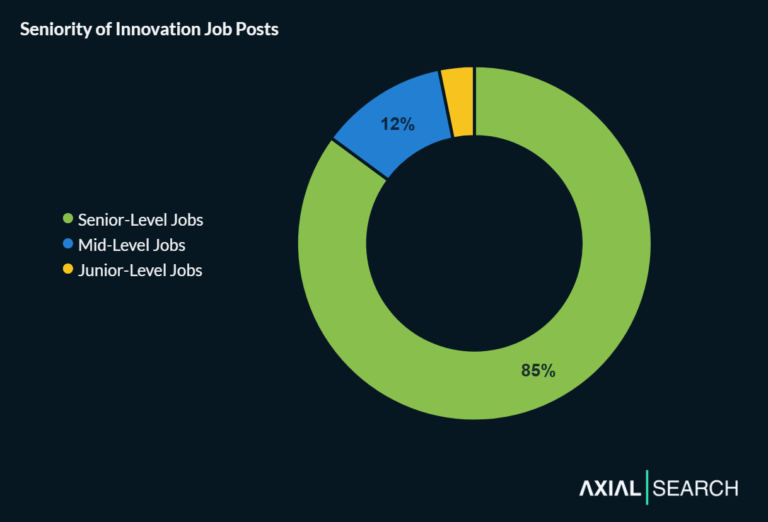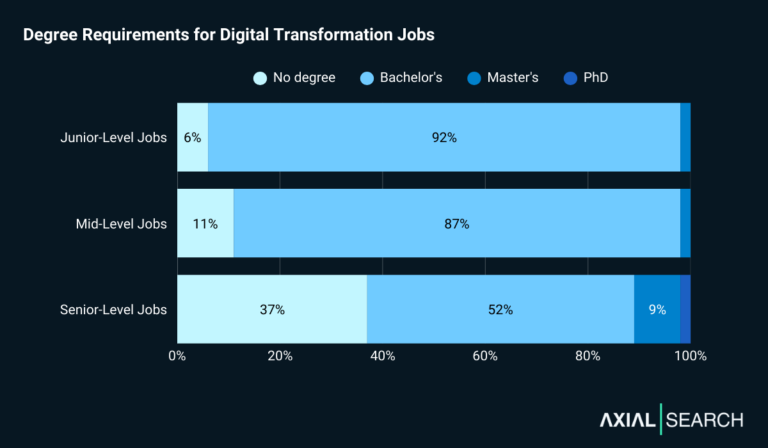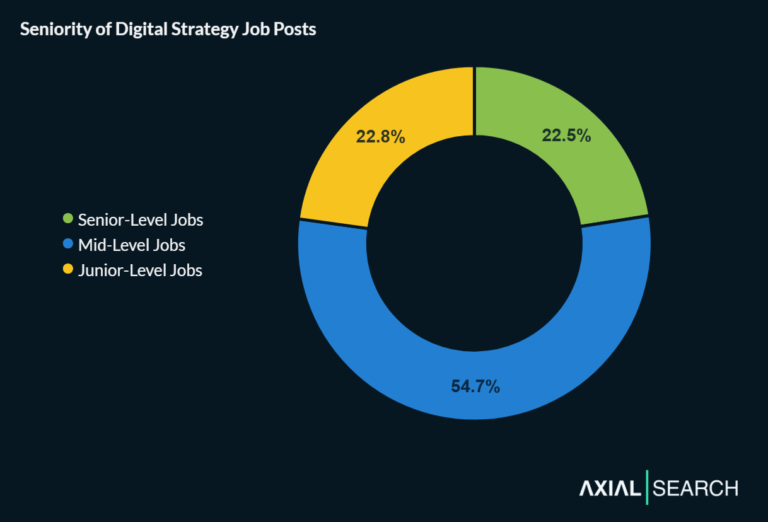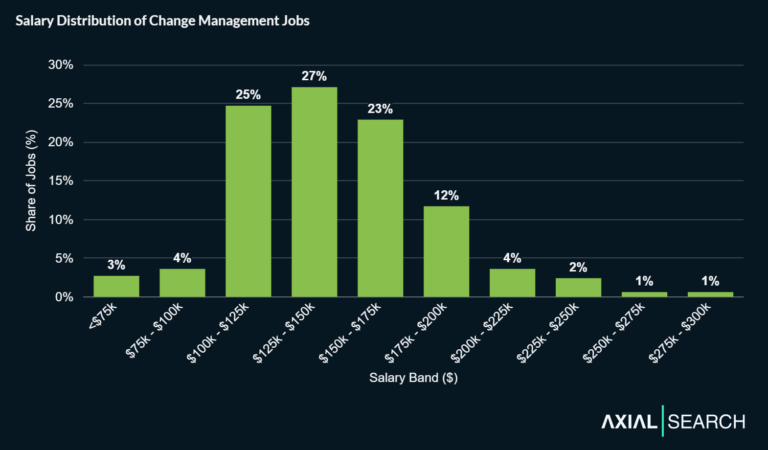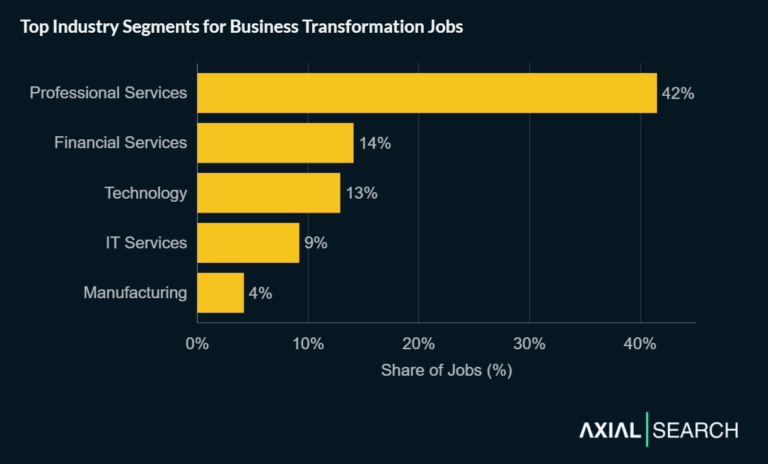Key Findings
- Most roles are mid-level: 65% of organizational development positions target professionals with 6+ years of experience
- Median salary is $157,500: The middle 80% of roles pay between $99K and $219K annually
- Certifications appear in 27% of posts: PROSCI Change Management, SHRM credentials and coaching certifications lead requests
- Service firms dominate hiring: Professional Services (27%) and Healthcare (15%), Manufacturing (8%) and Retail (8%) lead postings
- Texas leads the market: Major business hubs capture nearly half of all roles, with Texas, California and Illinois leading
- Advanced degrees increasingly required: Only 23% of junior roles skip degree requirements, dropping to 11% at senior levels where 38% require master’s degrees
The Role of an Organizational Development Professional
The patterns here reflect broader trends we track across transformation and change management recruitment, where organizations invest in professionals who can architect how work gets done.
We categorized each role by seniority and found the market heavily favors mid-level professionals – they account for nearly two-thirds of all postings.
We then extracted experience requirements (89% of roles mentioned a specific number) and calculated the average minimum at each level of seniority. Finally, we analyzed job titles to identify the most common naming conventions at each level.
- Junior (10% of roles)
- Minimum experience: 2 years
- Common titles: Organizational Development Specialist, Organizational Development Coordinator, Learning and Organizational Development Manager
- Mid-Level (65% of roles)
- Minimum experience: 6 years
- Common titles: Organizational Development Consultant, Manager Organizational Design, Senior Organizational Development Partner
- Senior (25% of roles)
- Minimum experience: 9 years
- Common titles: Director Organizational Design, Sr. Director Organizational Design and Effectiveness, Director Organizational Development and Strategic Workforce Planning
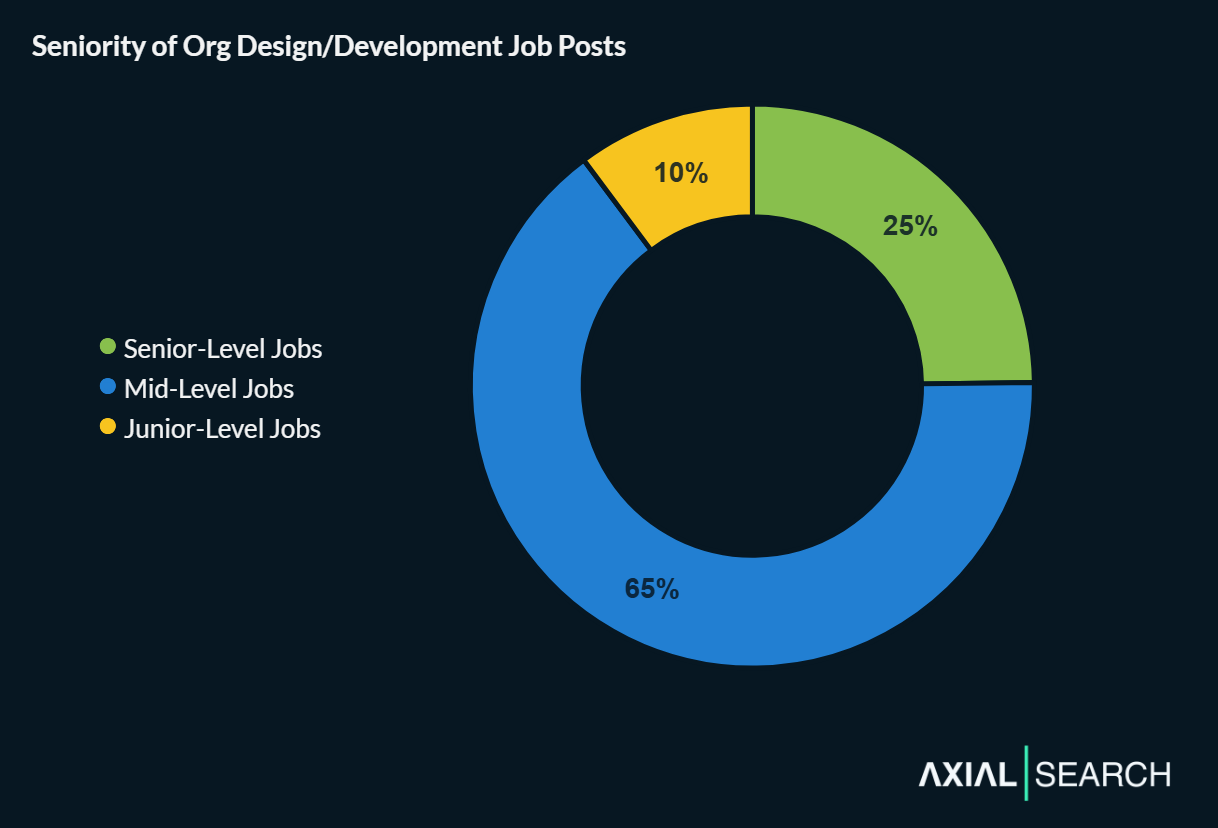
Most organizational design jobs are mid-level
What Do Organizational Development Jobs Involve?
So what is an organizational development professional actually responsible for day-to-day? We analyzed the language across all job posts to extract the core responsibilities at each level. What emerged is a clear progression of expectations from coordination to enterprise transformation:
Junior-Level Roles:
- Coordinate training programs and employee surveys
- Analyze business structures and resource utilization patterns
- Design training modules that enhance employee capability
Mid-Level Roles:
- Lead organizational design projects optimizing workforce structures
- Build learning and talent development frameworks enterprise-wide
- Partner with business leaders to implement scalable programs
Senior-Level Roles:
- Architect organizational design strategy advising C-suite on transformation
- Define organizational development excellence establishing scalable frameworks
- Drive cultural transformation through comprehensive talent strategies
Key takeaway: Junior professionals coordinate programs and analyze data, mid-level leaders own design projects and build frameworks, senior executives architect enterprise strategy. Each step up means less tactical execution and more influence over how the organization operates.
Who’s Hiring for Organizational Development?
Professional Services and Healthcare combine for 42% of organizational development postings – nearly half the market. Manufacturing follows at 8%, with Retail and Technology each capturing 8%, completing the top four sectors.
The dominance of service firms and healthcare reflects where workforce transformation creates the most strategic value – consulting engagements advising clients on organizational effectiveness and healthcare systems managing complex care delivery models.
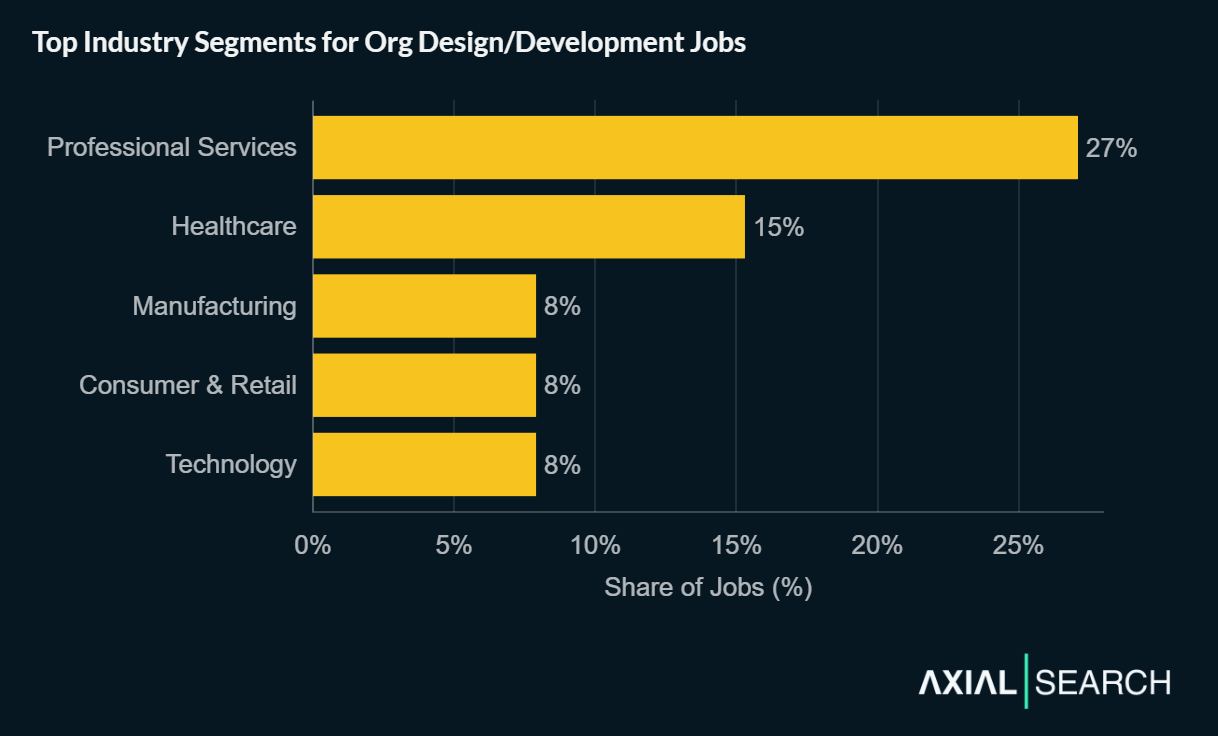
Service firms and healthcare dominate hiring
Large companies with 10,001+ employees account for 41% of postings – more than the broader workforce distribution across the U.S. economy of ~30%. Mid-sized organizations with 51-200 employees capture 20% of opportunities, meaning roughly six out of ten roles are at companies with either massive scale or growth-stage complexity.
This bimodal distribution suggests organizational development serves two contexts: mature enterprises formalizing workforce planning versus growing companies building people infrastructure for the first time.
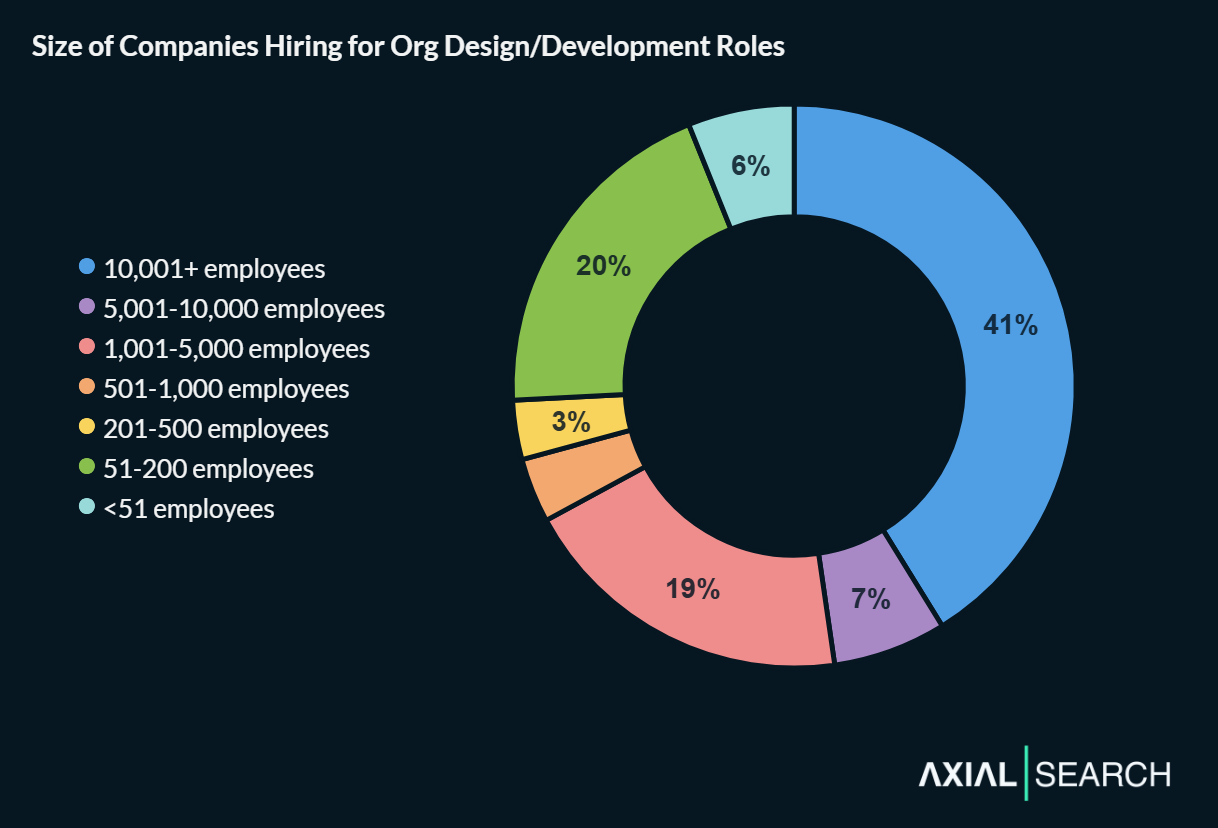
Large enterprises and mid-sized firms drive demand
Where Are Organizational Development Jobs Located?
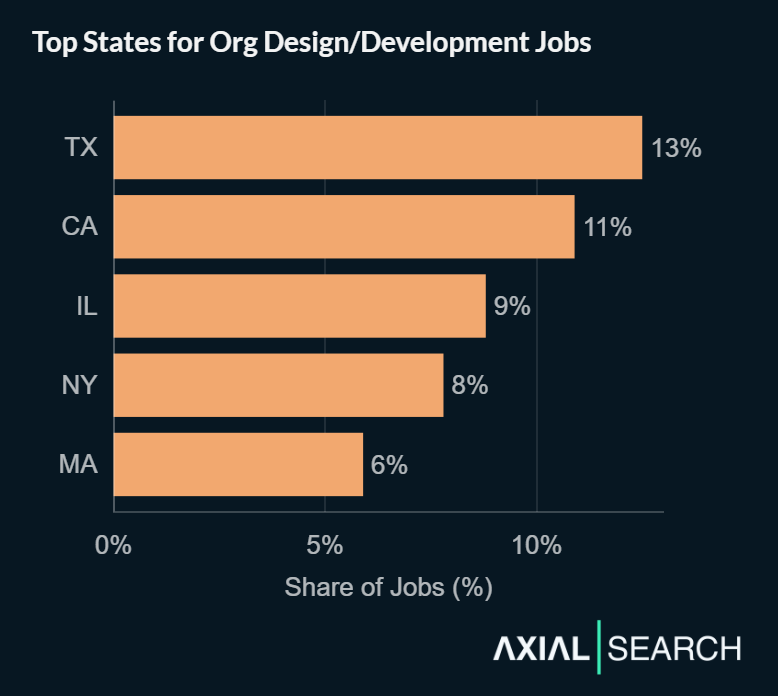
Half of roles concentrate in five states
Texas, California, Illinois, New York and Massachusetts together account for nearly half of all organizational development opportunities. The concentration in major business hubs reflects where corporate headquarters and consulting practices cluster.
Remote roles account for just 6% of postings despite the strategic nature of the work. This surprisingly low rate reflects how organizational development requires intensive stakeholder collaboration – facilitating leadership workshops, conducting cultural assessments and managing sensitive restructuring conversations demand physical presence.
Beyond the top five states, markets worth watching include North Carolina, Georgia and Washington – each capturing meaningful shares of opportunities and representing growing regional business ecosystems with maturing organizational capabilities.
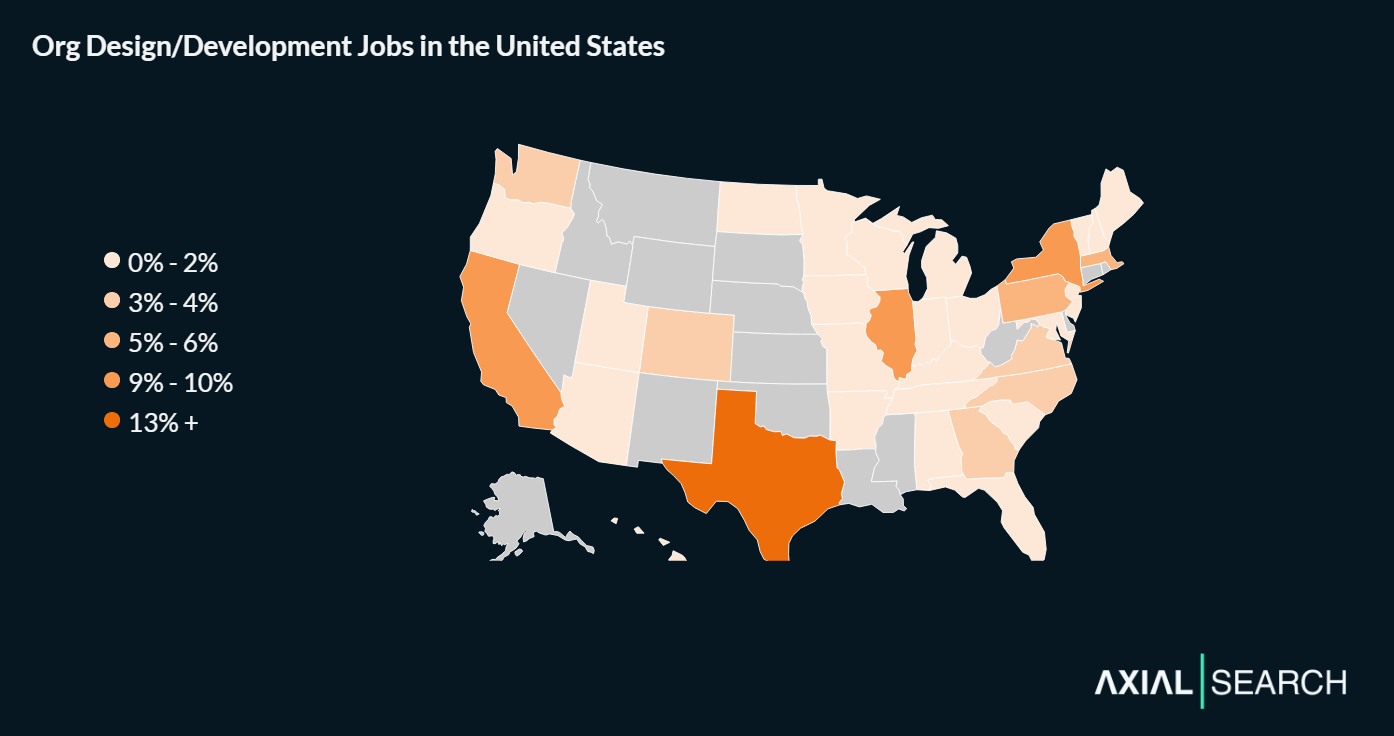
Remote work remains rare at 6%
Key takeaway: Nearly half of organizational development roles concentrate in five states. The stakeholder-intensive nature of the work keeps remote options limited – expect on-site or hybrid requirements for most positions despite the strategic scope.
Requirements for Organizational Development Jobs
We analyzed the minimum requirements of each job post and found that most organizational development jobs (81% overall) require some form of degree. The pattern tightens dramatically at senior levels.
For junior roles, 77% require a degree (67% bachelor’s, 10% master’s). The remaining 23% don’t specify formal education requirements.
Mid-level positions show similar patterns: 82% require a degree (71% bachelor’s, 11% master’s).
Senior roles have the strictest requirements: 89% require a degree (51% bachelor’s, 38% master’s). Just 11% don’t specify degree requirements.
The sharp increase in master’s degree requirements at senior levels – from 10-11% at junior and mid-level to 38% at senior – reflects how strategic workforce planning and cultural transformation increasingly demand specialized expertise in organizational psychology, human resources management or business administration.
Degree fields of study that are typically requested of organizational development professionals include:
- Human Resources (48%)
- Organizational Development (37%)
- Business Administration (27%)
- Business (18%)
- Psychology (16%)
- Industrial-Organizational Psychology (9%)
- Education (8%)
- Communications (5%)
- Business Management (4%)
- Learning & Development (3%)
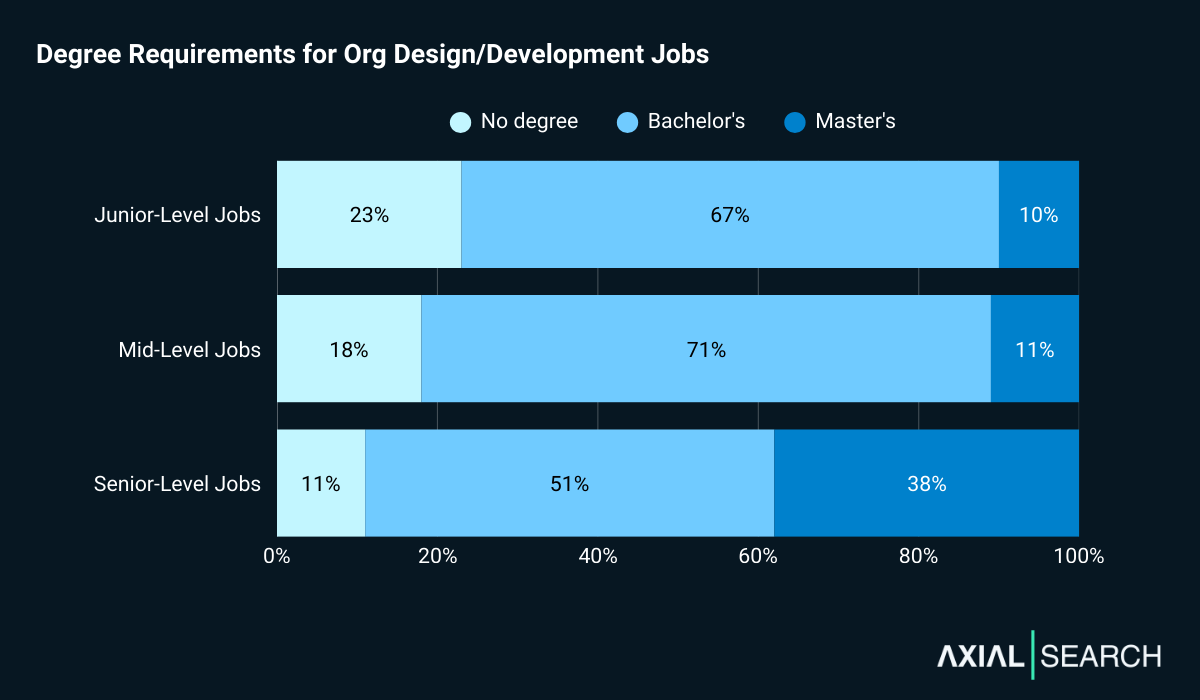
Advanced degrees increasingly required at senior levels
Requested Qualifications in Organizational Development Job Posts
Organizational development professionals must excel at change management, communication and stakeholder engagement. Change management appeared in 67% of listings, communication in 46%, and stakeholder engagement in 45% – reflecting the role’s nature as bridge between strategic vision and organizational adoption.
Facilitation (43%), data analysis (41%) and project management (39%) round out the core capabilities, emphasizing the need to translate workforce insights into structured initiatives while managing resistance across the enterprise.
Deep methodological expertise and an ability to apply systems thinking also matter. Organizational design frameworks, strategic workforce planning and adult learning theory are table stakes, supported by hands-on experience with succession planning, performance management and leadership development programs.
Just over one-quarter of postings (27%) request specific certifications, but when they do, these credentials lead:
- PROSCI Change Management
- SHRM-CP (Society for Human Resource Management Certified Professional)
- SHRM-SCP (Society for Human Resource Management Senior Certified Professional)
- Professional in Human Resources (PHR)
- Senior Professional in Human Resources (SPHR)
- Certified Professional in Talent Development (CPTD)
- International Coach Federation (ICF) Coaching Certification
- Project Management Professional (PMP)
Key takeaway: Change management capabilities appear in two-thirds of postings – it’s the foundational skill for organizational development work. Process optimization expertise helps, but stakeholder engagement and communication determine whether structural changes actually take hold. Certifications signal competence, yet facilitation skills drive adoption.
What do Organizational Development Jobs Pay?
Just over half (58%) of organizational development roles we analyzed included an advertised salary.
There was significant breadth in the ranges employers posted, so we normalized the data by selecting the midpoint for our analysis. From our experience, this is generally a much more indicative number for an employer’s target offer – especially in the current market where initial ranges often run wide.
Across the entire dataset of salaries, we found the median salary for organizational development positions to be $157,500. The middle 80% of salaries (10th to 90th percentile) ranged from $98,858 to $218,840.
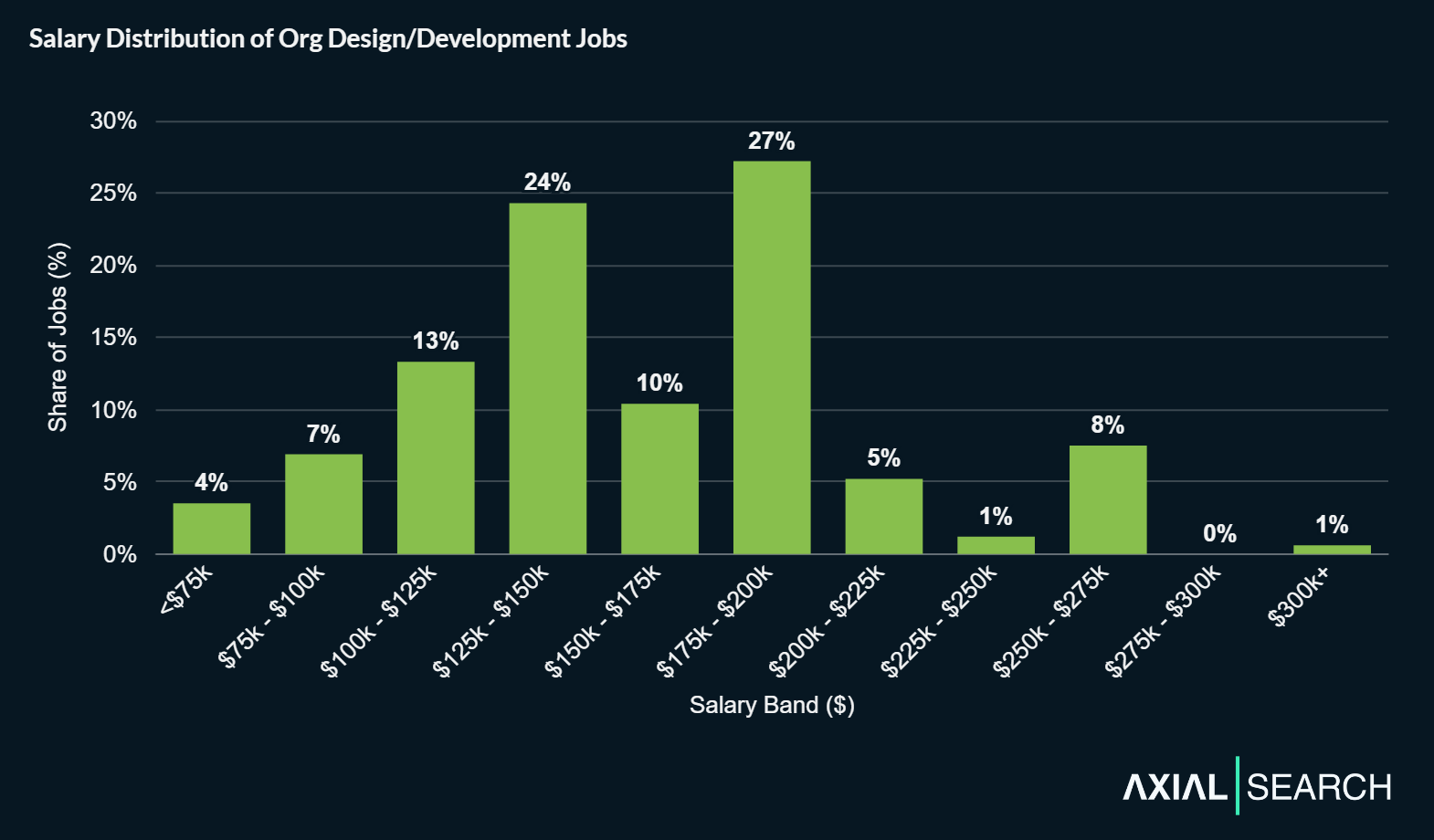
The middle 80% of organizational design salaries fall within $99K to $219K
Breaking organizational development salaries down by seniority reveals dramatic progression. Junior roles start at a median $97,410, with mid-level positions jumping 59% to $155,050. The leap to senior adds another 40% – reaching $216,350 median.
What’s striking is the range compression at mid-level. Junior salaries vary by $75,257 from bottom to top, mid-level by a much tighter $68,930, but senior roles spread across $144,350 despite commanding higher absolute numbers. This mid-level clustering suggests more standardized compensation for management positions, while specialist and director roles vary significantly based on strategic scope and industry context.
The overlap between tiers is modest compared to other functions we’ve analyzed – mid-level roles at the 90th percentile ($178,500) barely exceed senior roles at the 10th percentile ($125,000). This clear separation reflects how organizational design and development increasingly reward strategic influence over tactical execution.
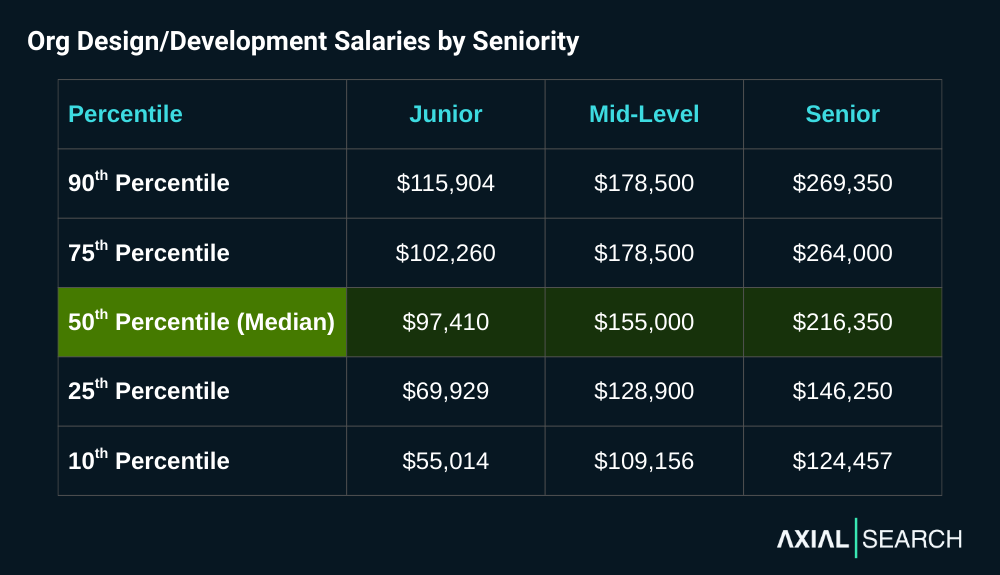
Senior roles earn more than double junior positions
Key takeaway: Organizational development positions pay exceptionally well. The median senior-level salary of $216,350 puts these roles in the top 5% of all earners in the United States. Even mid-level professionals earning the median $155,050 land in the top 11%.
Final Thoughts
For Candidates: Build change management and facilitation capabilities early – these skills appear in nearly half of postings and separate strong candidates from tactical coordinators. Pursue PROSCI or SHRM credentials to accelerate credibility. For mid-level roles, demonstrating you’ve led enterprise-wide design projects end-to-end matters more than years in seat. At senior levels, experience advising C-suite on transformation and establishing organizational frameworks commands the premium – master’s degrees in organizational development or industrial-organizational psychology increasingly become table stakes.
For Employers: The salary clustering around $155,050 for mid-level roles reflects market maturity – fall significantly below that and expect longer time-to-fill. The strongest signal for senior candidates is experience architecting organizational strategy at enterprise scale, not just managing individual development programs. Remote flexibility remains surprisingly limited at 6% despite strategic work – the stakeholder-intensive nature of organizational development requires physical presence for workshops, assessments and sensitive restructuring conversations. Consider hybrid arrangements but expect on-site requirements for most transformation initiatives.
Methodology
We analyzed 301 organizational design and development job postings collected from LinkedIn, Indeed and Glassdoor between November 2024 and January 2025. The dataset was limited to full-time roles posted in the United States that explicitly mentioned “organizational design,” “organizational development” or close variations in the job title.
Duplicate postings were removed using job title, company name and location matching. Seniority levels were determined by analyzing job titles alongside minimum experience requirements stated in each posting. When experience ranges were provided, the lower bound was used for consistency.
Salary data was extracted from the 58% of postings that included compensation ranges. We used the midpoint of each range for analysis, as this most closely reflects employer target offers in practice.
Industry classifications were assigned based on company descriptions and verified against LinkedIn company data where available. Geographic analysis was conducted at the state level using the primary job location listed in each posting.

